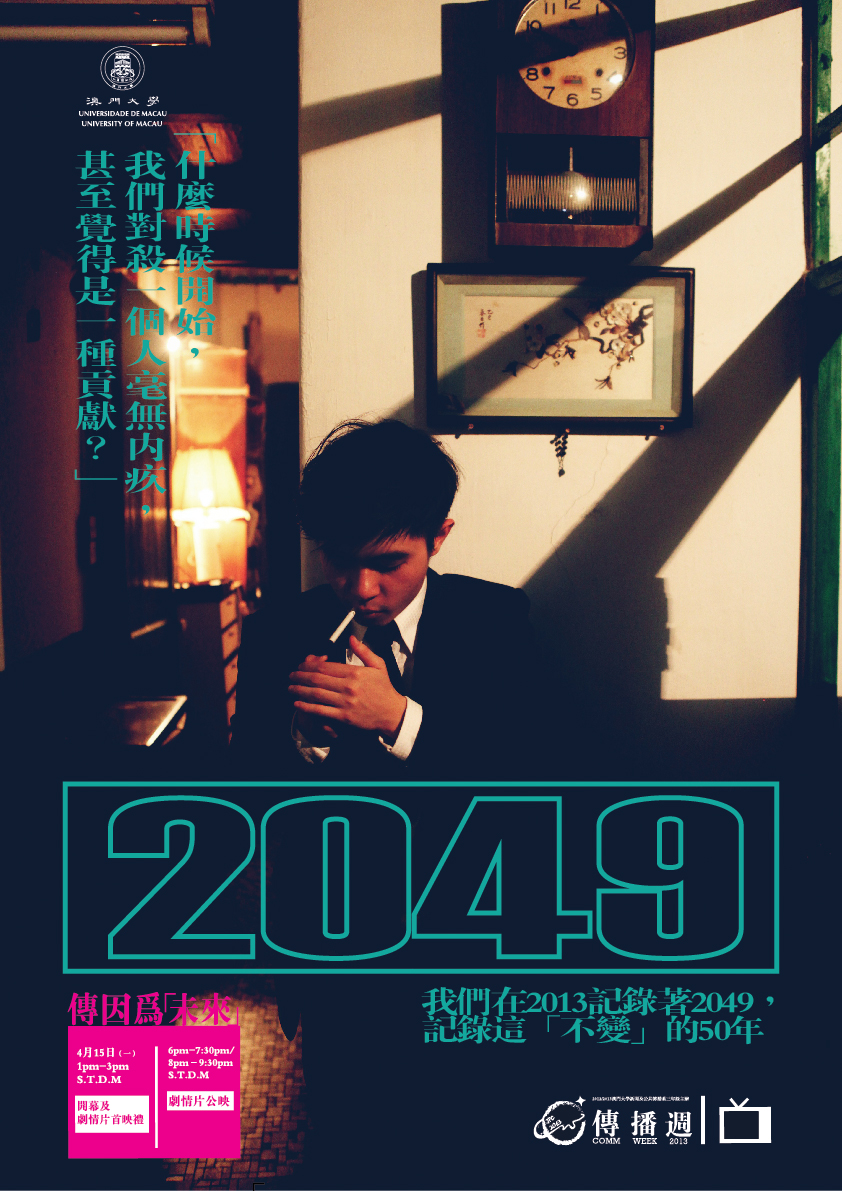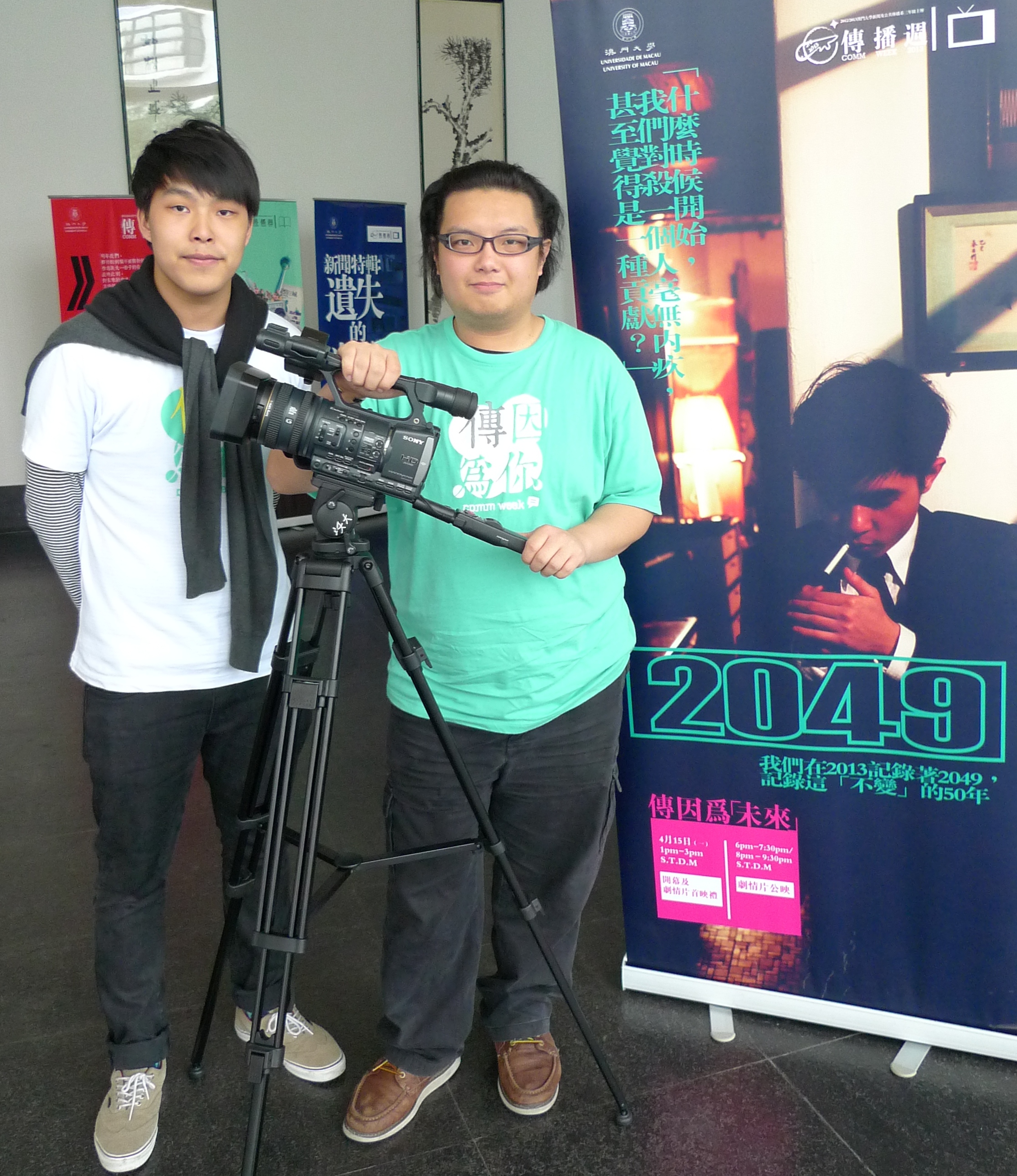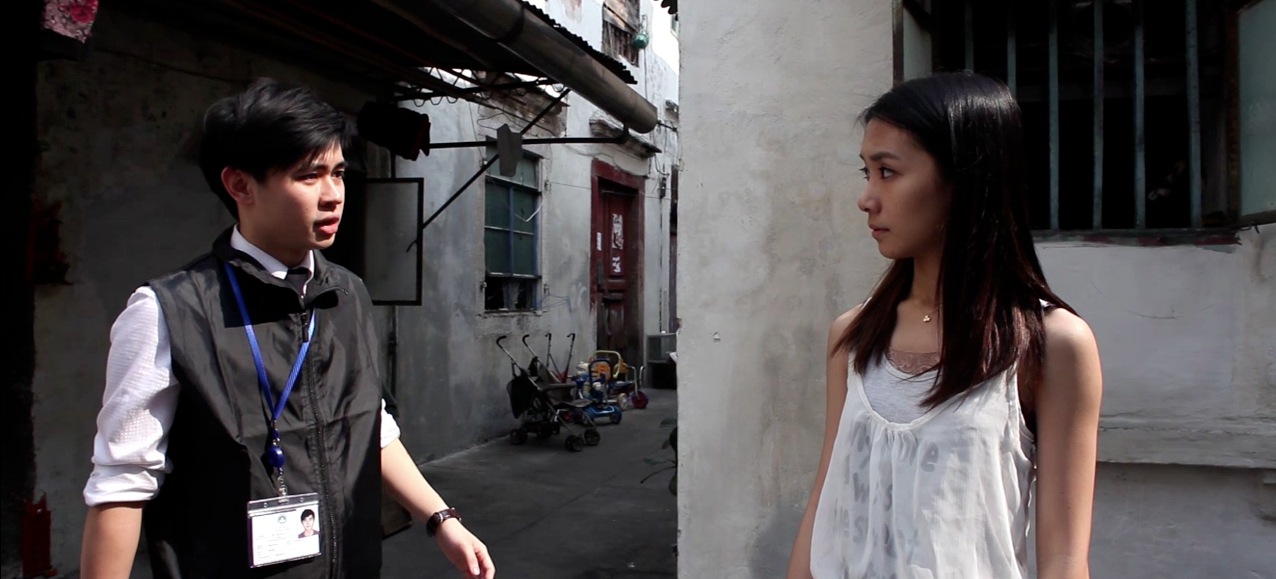A bland set lunch at a greasy spoon sets you back 1,000 dollars. Housing prices are ridiculously high and it takes three generations to pay back the mortgage. The traffic jam is so bad the bus driver has more than enough time to go to the public restroom. A girl who insists on speaking Cantonese instead of the official language Mandarin is reported to the authorities and beaten to death on the street in front of indifferent onlookers. The city has become so overcrowded the government decides to implement a “Population Control” policy which exterminates people with disabilities and those aged above 50. These are the chilling scenarios depicted in 2049, a film made by students from the Department of Communication, University of Macau (UM), which received rave reviews after its official screenings on 15 April.
The film is part of the activities of the Communication Week 2013, organised by third-year students of the Department of Communication. Echoing this year’s theme, “Feel with Your Heart, Embark on a New Start,” the film wishes to make people re-think about the present and future of Macao.
Houin Ao, who was on the screenwriting team, says, “Sometimes I find myself wondering, what would Macao be like in the future? Many people nowadays couldn’t care less about what’s happening around them. So we thought what if everything in society became really ridiculous and bizarre? How would people react if they were backed into a corner? Then we started to think, what issues would resonate most with the viewers? Finally we decided to focus on housing prices, prices of consumer goods, Cantonese no longer being the official language, environment pollution, and stuff like that. ”
Perry Fok, director of the film, says the name “2049” was inspired by 2046, a film by the famous Hong Kong director Wong Kar-Wai. Perry says 2046 helped him to understand the power of images on the audience and he hoped the film could first draw the audience in with images and then make them think.
Perry is very grateful to fourth-year students for their great support during the production process. “Not only did they provide a lot of valuable advice, they also lent their brand-new cameras and lenses to us. Some have already graduated, but they came back to teach us how to do the post-editing,” recalls Perry. “I also need to thank all the participants of the film. All of them were busy, what with the coursework and exams, but they never complained. They stood behind the team until the film was finished.”
The film was screened three times, each time to a full-house audience. Lam Chun Yat, a first-year student of psychology, says, “When I watched the trailer, the line ‘2049, could this be the future of Macao?’ caught my eye, and I immediately decided I didn’t want to miss the film. And after watching the film, I couldn’t help but think, What will Macao be like fifty years from now?” Lio Chi Heng, deputy editor-in-chief of the Macao Daily News, was also generous in her praise for this film. She wrote in an article that, “The most pressing issues for Macao people, like skyrocketing housing prices, population surge and deteriorating living environment, are discussed in the film. The saddest thing is that we are losing freedom and independent thinking without even realising it. The scene where the girl who insists on speaking Cantonese instead of the official language Mandarin is beaten to death on the street is my personal favorite in the whole film. I found it very thought-provoking.”
For the full version, please refer to Chinese Version.
Should you have any enquiries about the information, please feel free to contact the Information Executives Ms Lei or Ms Fok at(853)8397 4325 or prs.media@um.edu.mo or visit UM webpage www.umac.mo.
The film is part of the activities of the Communication Week 2013, organised by third-year students of the Department of Communication. Echoing this year’s theme, “Feel with Your Heart, Embark on a New Start,” the film wishes to make people re-think about the present and future of Macao.
Houin Ao, who was on the screenwriting team, says, “Sometimes I find myself wondering, what would Macao be like in the future? Many people nowadays couldn’t care less about what’s happening around them. So we thought what if everything in society became really ridiculous and bizarre? How would people react if they were backed into a corner? Then we started to think, what issues would resonate most with the viewers? Finally we decided to focus on housing prices, prices of consumer goods, Cantonese no longer being the official language, environment pollution, and stuff like that. ”
Perry Fok, director of the film, says the name “2049” was inspired by 2046, a film by the famous Hong Kong director Wong Kar-Wai. Perry says 2046 helped him to understand the power of images on the audience and he hoped the film could first draw the audience in with images and then make them think.
Perry is very grateful to fourth-year students for their great support during the production process. “Not only did they provide a lot of valuable advice, they also lent their brand-new cameras and lenses to us. Some have already graduated, but they came back to teach us how to do the post-editing,” recalls Perry. “I also need to thank all the participants of the film. All of them were busy, what with the coursework and exams, but they never complained. They stood behind the team until the film was finished.”
The film was screened three times, each time to a full-house audience. Lam Chun Yat, a first-year student of psychology, says, “When I watched the trailer, the line ‘2049, could this be the future of Macao?’ caught my eye, and I immediately decided I didn’t want to miss the film. And after watching the film, I couldn’t help but think, What will Macao be like fifty years from now?” Lio Chi Heng, deputy editor-in-chief of the Macao Daily News, was also generous in her praise for this film. She wrote in an article that, “The most pressing issues for Macao people, like skyrocketing housing prices, population surge and deteriorating living environment, are discussed in the film. The saddest thing is that we are losing freedom and independent thinking without even realising it. The scene where the girl who insists on speaking Cantonese instead of the official language Mandarin is beaten to death on the street is my personal favorite in the whole film. I found it very thought-provoking.”
For the full version, please refer to Chinese Version.
Should you have any enquiries about the information, please feel free to contact the Information Executives Ms Lei or Ms Fok at(853)8397 4325 or prs.media@um.edu.mo or visit UM webpage www.umac.mo.





